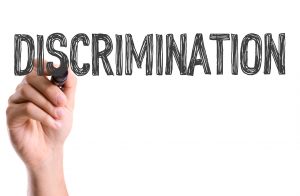Discrimination has a fairly clear definition in the employment law. Generally speaking, it must entail an unfavorable employment action that is conducted because of your race, sex, religion, national origin, physical handicap, or age; it is not enough for someone to be unpleasant to you at work. Gender identity and sexual orientation are also protected in several states.
It might be especially difficult to demonstrate the “because of” portion of the equation. How can you prove that your company didn’t give you a promotion only because of your ethnicity or gender, for example?
An important case involving disability discrimination
A California employment law decision defined what it means to face physical handicap discrimination. A county sheriff had knee surgery in Wallace v. County of Stanislaus and was thereafter unable to carry out certain of his duties. Later, Mr. Wallace was downgraded to the position of bailiff before being fired and put on unpaid leave.
He subsequently brought legal action against the County and Sheriff’s Office. A jury concluded that even though Mr. Wallace shouldn’t have been demoted, the County didn’t want to harm him and didn’t treat him differently because of his condition.
The Fifth District Court of Appeals ruled in favor of Mr. Wallace on appeal. It was decided that in situations involving handicap discrimination, employees are not required to demonstrate that an employer had any malice when it took a negative action against them.
The court determined that discrimination claims involving disabilities are distinct from other types of cases since there is frequently concrete proof of an employer’s motive (such as an employee being injured or being diagnosed with an illness and then being fired or demoted as a result). The majority of other sorts of discrimination complaints, in contrast, are supported by circumstantial evidence and lack a clear connection between the employee’s position and the adverse employment action.
The Court of Appeals determined that discrimination against an employee may still be shown even in cases where an employer had no malice toward the employee. If a physical impairment is a “substantial motivating factor” in the employer’s decision to take adverse employment action against the employee, the employer must treat the individual differently (such as firing, demoting or a refusal to promote).
The burden of proof rests solely on the employee to establish that the employer was aware of or believed that the employee had a disability—a physical condition that restricted a major life activity—and that this physical condition was a significant factor in the employer’s decision to take adverse employment action against the employee.
The fact that it will be simpler for employees with physical impairments to prove that they were subjected to discrimination because of their condition makes this decision extremely beneficial for them. Additionally, it means that even a minor infraction of an employment rule, such failing to make reasonable accommodations, may be sufficient to hold an employer accountable for disability discrimination.
Contact us today if you believe you have been the victim of unlawful discrimination
Employment law is a complicated area of the law, especially when it comes to discrimination lawsuits. Contact PLBH right away at (800) 435-7542 or info@plblaw.com if you think your employer has discriminated against you because of your physical handicap, race, gender, age, religion, or national origin. We will fight tenaciously to defend your rights since we have extensive expertise with all sorts of job discrimination claims, including those alleging discrimination based on physical impairment.

